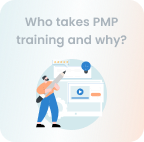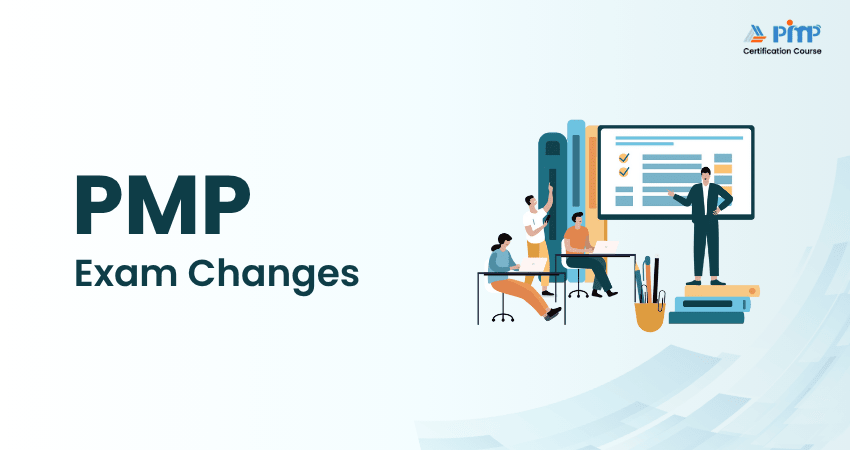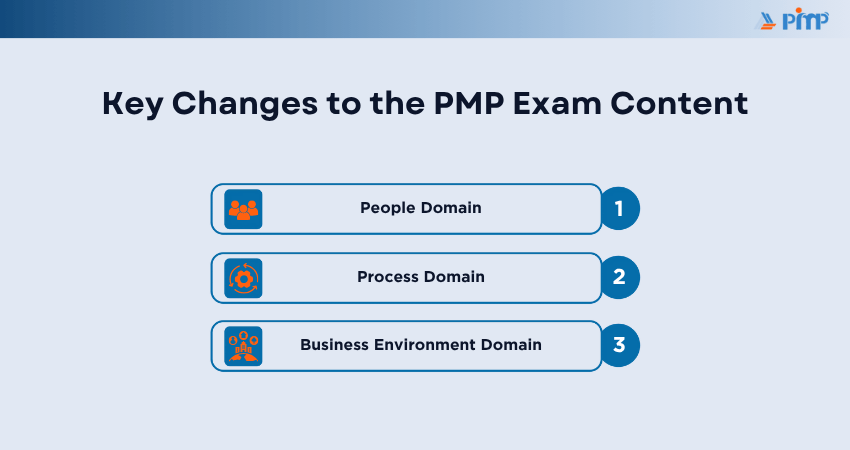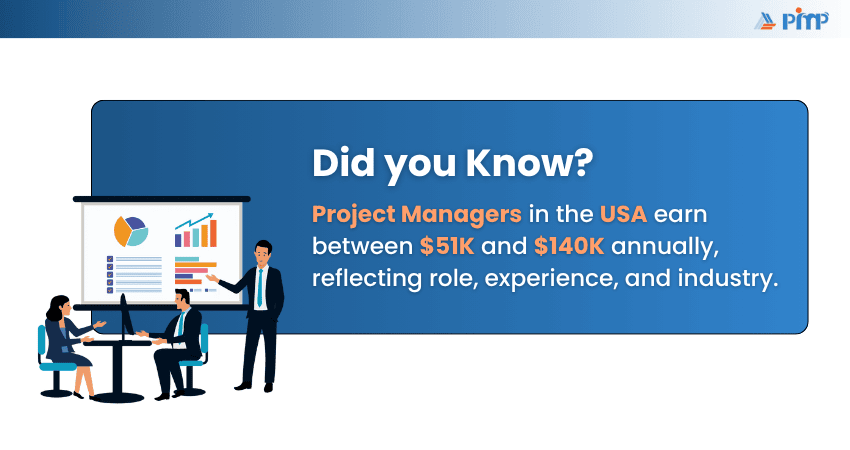









The PMP® exam in 2026 isn’t just about answering questions, it’s about proving you can thrive in the modern project world. Every PMP Exam Changes brings the test closer to real-life challenges, where you balance people, process, and business goals under pressure.
In this blog, we’ll explore the latest PMP Exam Changes, exam format, and study tips. We’ll also look at the consequences of these changes and what they mean for your preparation.
Table of Contents
1) PMP Exam Content Changes
2) PMP Exam Format
3) Study Tips for the New PMP Exam
4) Consequences of the PMP Exam Changes
5) Conclusion
The PMP Exam Changes focuses on testing your ability to handle different aspects of Project Management. The content is divided into three main domains. These domains form the exam’s backbone, with focus updated for modern projects.

The People Domain measures how well you can manage teams and stakeholders. Modern Project Management is not only about processes but also about leading people effectively.
a) It covers topics like conflict resolution, team motivation, and communication.
b) You will face questions about leadership styles, managing virtual teams, and encouraging collaboration.
c) With hybrid and remote work becoming common, more scenarios now test your ability to manage teams spread across different locations.
Example: You may get a situational question like, “How would you resolve a conflict between two team members in a remote project setup?”
The Process Domain focuses on the technical side of managing projects. This is about applying tools, methods, and techniques to deliver results.
a) It includes areas such as scheduling, budgeting, Risk Management, and Quality Control.
b) More emphasis is now given to Agile and hybrid approaches because most organizations combine traditional methods with modern flexible approaches.
c) Questions often use case studies where you must choose the best action based on time, cost, and scope balance.
Example: A question could test your ability to decide whether to use predictive planning or an iterative sprint-based approach for a new project.
The Business Environment Domain is about aligning projects with overall organizational goals.
a) It looks at how projects bring value to the business.
b) Topics include compliance, benefits realization, and supporting organizational change.
c) The 2026 exam puts more focus on sustainability, governance, and delivering measurable outcomes.
Example: You may be asked how to ensure that a project continues to add value even after delivery.
Learn Agile mindset, practices, and frameworks to surge ahead in projects with our PMI-ACP® Certification – Join now!
The 2026 PMP Exam Changes ensure the test checks both your knowledge and ability to apply it in real project situations. Here’s what to know:
The PMP Exam in 2026 includes 180 questions in total:
a) 175 scored questions
b) 5 unscored pretest questions (used to test future exam items, randomly placed and not identified).
Exam Type:
The PMP Exam is a computer-based test featuring 180 questions in various interactive formats, including multiple-choice, multiple-response, matching, hotspot, and fill-in-the-blank questions.
Question Types:
The exam begins with an optional tutorial and ends with an optional survey, each taking about 5–15 minutes. This time is separate and not counted within the 230 minutes of exam duration.
Time and Breaks:
a) Total time: 230 minutes (just under 4 hours).
b) Two 10-minute breaks:
i) After questions 1–60.
ii) After questions 61–120.
(You cannot return to previous sections once a break begins.)
c) A short tutorial before the exam and a survey after (5–15 minutes each) are optional and not included in the exam time.
You will have the full 230 minutes to complete all 180 questions across three sections.
Preparing for the PMP Exam needs a clear plan and smart methods. Instead of memorizing everything, focus on understanding concepts and practicing in real situations. Here are some easy tips to guide your preparation:

The PMBOK® Guide is the main book for PMP Exam prep. It explains all project phases like starting, planning, executing, monitoring, and closing. The latest 7th edition (released in August 2021) is updated to match modern project challenges. Reading it carefully will help you become more confident, creative, and effective at work.
Flashcards are a quick and simple way to learn important points. Write down key terms, formulas, or tricky concepts on cards. Keep them with you to review anytime. You can also find ready-made flashcards online if you don’t want to create your own.
A good PMP preparation book makes studying easier. Pick one written by an expert in Project Management and updated for the new exam pattern. The best books include lots of practice questions, sample exams, and easy-to-understand explanations.
PMI Chapters organize meetups and study groups where you can connect with other professionals. They are great places to learn from experienced Project Managers, share tips, and build your network.
PMP simulators let you practice in a real exam-like environment. They help you manage time, get used to the question style, and identify weak areas. Make sure to practice with a timer and avoid distractions, just like the actual test.
A boot camp is an in-depth training program run by experts. It helps you stay focused, learn quickly, and clear doubts. Instructors often share real-world advice, making it easier to understand tricky topics.
Plan your study with a clear timeline. Break down topics week by week and include time for revision and practice tests. A structured plan ensures you don’t miss anything and stay on track before exam day.
Online workshops are guided by certified trainers and often cover the PMBOK Guide and the latest syllabus changes. Participate actively by asking questions, joining group discussions, and taking notes. Attending regularly will make your preparation stronger and more consistent.
Begin your Project Management career strong with Certified Associate in Project Management (CAPM) ® Training - Join now!
The 2026 updates to the PMP Exam Changes affect both candidates and employers in many ways:
1) Broader Preparation Needed:
You can’t just learn formulas anymore. The exam now checks if you can use your knowledge in real situations. To pass, you need to understand both traditional methods and Agile/hybrid approaches.
2) More Focus on Leadership:
The exam now gives more importance to the People domain. Questions will test how you lead teams, solve conflicts, and manage stakeholders. Good soft skills are just as important as technical knowledge.
3) Business Alignment Matters:
In the Business Environment domain, you must show how projects connect with the company’s goals. The exam looks for proof that your project delivers real value, not just results.
4) Practical Preparation is Key:
Instead of rote learning, you need to practice with simulators, case studies, and real scenarios. Having work experience helps a lot because many questions are situational.
5) More Value for Employers:
Companies can trust PMP-certified professionals to handle today’s complex projects. The updated exam makes the certification even more respected and valuable worldwide.
The PMP Exam Changes make the certification more practical, people-focused, and aligned with real project environments. While it demands broader preparation and stronger skills, it also increases the value of PMP in today’s workplace. With the right approach, candidates can succeed and unlock new career opportunities in Project Management.
Advance your career with globally recognized Project Management expertise. Join our Project Management Institute (PMI)® Certification now!






© Copyright 2025. All rights reserved. Contact: PMP® TRAINING ACADEMY.


